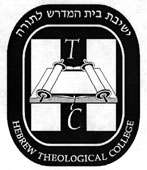Hebrew Theological College
 | |
| Type | Private, Jewish |
|---|---|
| Established | October 15, 1921[1] |
| Rosh HaYeshiva | Rabbi Avraham Friedman |
| Students |
145 high school 50 men's college 165 women's college |
| Location |
|
| Campus | Suburban |
| Website | www.htc.edu |
The Hebrew Theological College, known colloquially as "Skokie Yeshiva," is a Yeshiva in Skokie, Illinois, which also functions as a private university on campus. The primary focus of the Yeshiva is to teach Torah and Jewish traditions. It was founded in 1922 as a Modern Orthodox Jewish institution of higher education in America and currently caters to students from Modern Orthodox, Yeshivish and Chasidish backgrounds.
Hebrew Theological College's primary purposes are to prepare students for the assumption of formal roles as educators, as well as to train eligible students to meet the requirements and demands of rabbinic ordination. As its secondary purpose, Hebrew Theological College endeavors to provide its students with broad cultural perspectives and a strong foundation in the Liberal Arts and Sciences to facilitate a creative synthesis of general and Jewish knowledge. In so doing, the College also provides an excellent background for the pursuit of advanced professional training...[2]
Organization
The Yeshiva consists of a Bet Midrash, a Rabbinical School, the Bellows Kollel, and the Fasman Yeshiva High School. The College is composed of the Bressler School of Advanced Hebrew Studies and the Kanter School of Liberal Arts and Sciences. All students complete a Bachelor of Arts in Judaic Studies through the Bressler School, with the option of a second major through the Kanter School.
The men's program offers a B.A. with a focus in Judaic studies and specifically Talmud, with second majors offered in Business, Accounting, and Psychology. The woman's program, located on a separate campus at the Blistein Teachers Institute for Women, offers Judaic Studies majors in Bible, Hebrew Language, and Jewish History, with dual majors available in Business, Computer and Information Sciences, Education (including Elementary and Special Education), English and Psychology.
The Yeshiva also has a men's Kollel with some of the kollel members studying for ordination in a Smichah Program led by Rabbi Chaim Twerski.
The College is accredited by the North Central Association of Colleges and Schools.
History
The school was founded in the city of Chicago in 1921 by Rabbi Chaim Tzvi Rubinstein and Rabbi Saul Silber. The school's original location was at 3448 West Douglas Boulevard in the North Lawndale community.[3] Hebrew Theological College moved to Skokie (a northern suburb of Chicago) in 1958.
Throughout the history of Hebrew Theological College, its leadership has been shared by its rosh yeshiva and its Chief Executive Officer, formerly known as the President, currently known as the Chancellor.
Founders
Rabbi Rubinstein (1872–1944) was an alumnus of Volozhin Yeshiva who arrived in America in 1917. Rabbi Silber (1876–1946) was a pulpit Rabbi in Chicago and served as president of the school for its first twenty-five years.[4]
Roshei yeshiva
Rabbi Nissan Yablonsky, an alumnus of Slabodka, served as the first rosh yeshiva for the first few years. He was followed by Rabbi Chaim Korb. Rabbi Chaim Zimmerman served as rosh yeshiva from 1947 to 1966.
Rabbi Simon Kramer was appointed President. Under his stewardship, Hebrew Theological College reached its greatest enrollment, with approximately 300 students in the high school and 200 in the college. In 1966 Rabbi Aaron Soloveichik became rosh yeshiva. In 1974, he was forced out of his position, and thus founded Yeshivas Brisk in Chicago. In 1985, Rabbi Shlomo Morgenstern, an alumnus of Yeshivas Chevron, became rosh yeshiva. Rabbi Morgenstern served as rosh yeshiva for 22 years. On January 27, 2008, Rabbi Avraham Friedman was named rosh yeshiva.
A list of the Roshei yeshiva can be found at http://www.htc.edu/component/k2/item/228.html.
Presidents / Chancellors
The founding president was Rabbi Saul Silber(1922–1946). He was followed by Rabbi Oscar Z. Fasman (1946–1964) and Rabbi Simon G. Kramer (1964–1970), and then by Rabbi Irving J. Rosenbaum. Rabbi Dr. Don Well was president from 1981-1989, Rabbi Dr. Jerold Isenberg from 1989-2013
Faculty
The current faculty include:
- Interim CEO- Rabbi Shmuel L. Schuman
- Rosh HaYeshiva - Rabbi Avraham Friedman
- Chancellor Emeritus - Rabbi Dr. Jerold Isenberg
- Mashgiach – Rabbi Zvi Zimmerman
- Chief Academic Officer & Dean (Men's division) – Rabbi Dr. Zev Eleff
- Menahel Ruchani (Blitstein Institute - Women's division) – Rabbi Binyamin Olstein
- Dean (Blitstein Institute - Women's division) – Dr. Esther Shkop
- Principal (High School-Fasman Yeshiva) – Rabbi Moshe Wender
- Assistant Principals (High School) - Rabbi Mordechai Ginsparg, Mr. Peter Gobel
Past members of the faculty include Rabbi Dr. Eliezer Berkovits who from 1958 until 1967 was the chairman of the department of Jewish philosophy.
Notable alumni
- Dr. David Applebaum
- Rabbi Elchanan Greenman
- Dr. Menachem Kellner
- Rabbi Dr. Moses Mescheloff
- Rabbi Aryeh Rottman (Dean, Mercaz Hatorah, Jerusalem)
- Rabbi Dr. Chayim Rozwaski (Berlin)
- Rabbi Dr. Abraham J. Twerski
- Rabbi Berel Wein
- Rabbi Chaim Zimmerman
- HaRav Nosson Tzvi Finkel - Rosh Yeshiva, Mir Yerushalayim
- Rabbi Moshe Gottesman - Rabbi, educator and community leader
See also
References
- ↑ "History of Hebrew Theological College". Hebrew Theological College. Retrieved 2009-05-14.
- ↑
- ↑ "2006 Ten Most Endangered Historic Places" (PDF). Landmark Illinois. 2006. Retrieved 2009-05-14.
- ↑ Wein, Berel (1990). Triumph of Survival. p. 334. ISBN 1-57819-593-4.
http://www.htc.edu/about/history.html http://www.htc.edu/about/history/roshei-yeshiva-zqtl.html